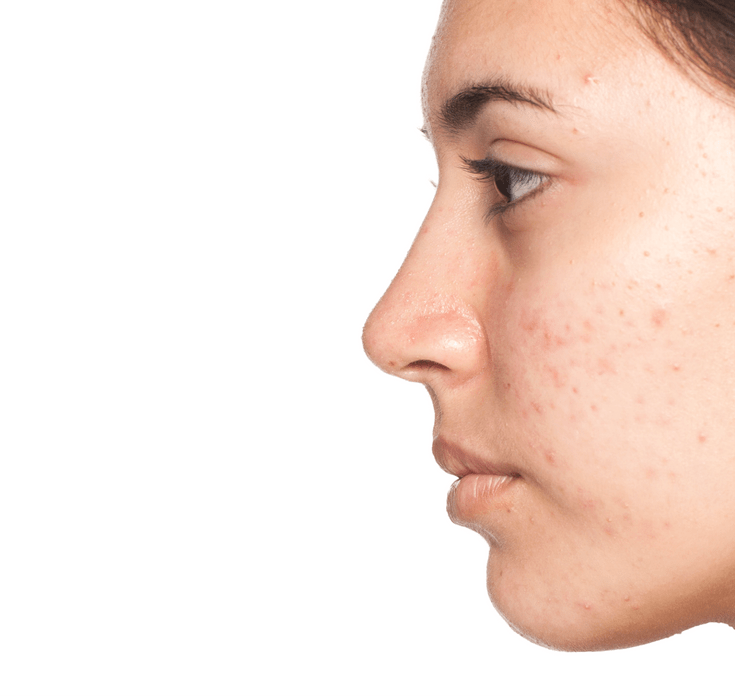Ever heard that dairy and acne are like two peas in a pod? In this article, we’re breaking down the research on the connection between dairy consumption and skin troubles.
Far too many people suffer from the physical and mental hardships of a skin condition that may be safely managed through diet and lifestyle changes. In this article, we’re highlighting the link between dairy and acne.
What is acne?
First things first: acne is not just a superficial skin condition. The incredibly common skin disease affects more than 17 million Americans and the vast majority of the adolescent population. Research has found that acne can have a profound effect on your overall quality of life, including your social, psychological, and emotional health.
The Science Behind Acne
Acne is a skin disease characterized by inflammation of the oil-producing glands and hair follicles of the skin. Pimples develop when oil secretions and dead skin cells build up and cause blocked pores.
This creates a friendly environment for bacteria and yeast to overgrow in your pores. As a result, the body triggers an inflammatory response that produces those swollen, red, pussy bumps we all love so much. Research suggests that diet can influence the hormones (think: insulin, insulin-like growth factor-1, androgens) involved in this process.
Recommended Reading: Is Sugar Causing your Breakouts?
Potential Causes of Acne
- Hormonal activity, such as menstrual cycles, puberty, menopause, pregnancy, and starting or stopping birth control.
- Stress.
- Overproduction of sebum (oil).
- Accumulation of dead skin cells.
- Buildup of bacteria in the pores.
- Skin irritation or scratching of any sort will activate inflammation. Friction or pressure on the skin caused by items such as telephones or cell phones, helmets, tight collars and backpacks.
- Certain medications like anabolic steroids, some anti-seizure medications, the anti-tuberculosis drugs isoniazid and rifampin, lithium and iodine-containing medications.
- Exposure to high levels of chlorine compounds, particularly chlorinated dioxins, may cause severe, long-lasting acne, known as chloracne.
What About Dairy and Acne?
Although still controversial, the current research suggests that there is a connection between dairy and acne. Unfortunately, all of the research on this topic comes from observational studies, which are limited in their ability to test cause and effect.
That said, there do seem to be consistent results regarding dairy consumption and acne among large observational studies. According to these studies, higher intakes of milk are associated with increased acne prevalence. Unfortunately the observational study design limits the ability to determine the specific amount of milk intake that may exacerbate acne.
Researchers hypothesize that the association between acne and dairy may be due to the effect of milk on insulin and IGF-1 concentrations in the body, the growth hormones in milk, and/or the body’s response to milk protein. More specifically, the carbohydrates found in milk may stimulate the release of hormones (androgens, insulin, IGF-1) that increase the production of oil and skin cells that block your pores.
Milk also contains several of its own growth-stimulating hormones that may trigger the same hormonal response in the body. In addition, whey and casein (the main proteins found in milk) also have various growth-promoting effects. These effects can contribute to a hormonal response in the body that may exacerbate acne development.
What to do next?
Suffering with persistent breakouts can take a toll on your confidence and overall quality of life. Although research on this topic is sparse and limited by study design, there’s convincing evidence of a connection between dairy and acne. While we need more high quality studies to further understand the relationship between dairy and acne, reducing your dairy intake may be a promising treatment for mild to severe acne.
Try eliminating dairy for 30 – 60 days and see if you notice any difference in your skin. Dairy is a key source of calcium, so make sure you are getting enough of those nutrients from non-dairy foods like broccoli, sardines, bok choy, kale, almonds, and calcium-fortified non-dairy milks like almond and coconut milk. Choose organic options whenever possible to decrease your exposure to pesticides.
Recommended Reading: Acne: The Role of Medical Nutrition Therapy





